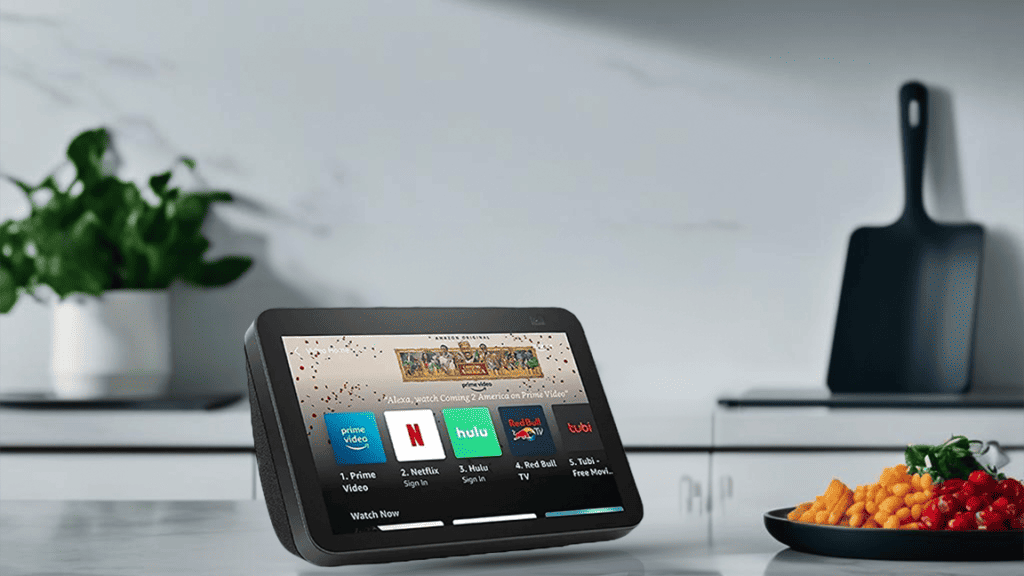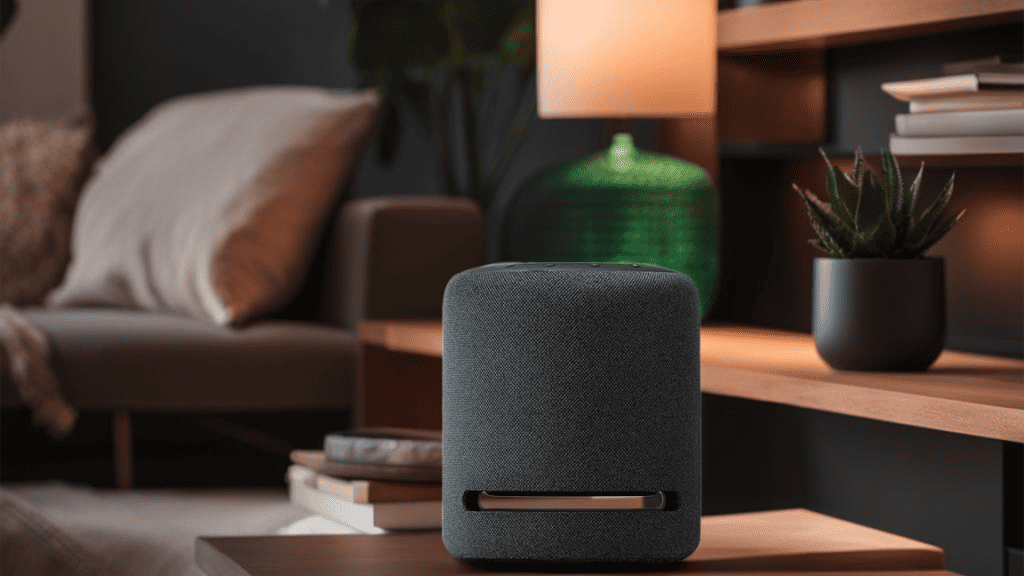Key Takeaways:
- Home automation security systems offer convenience and peace of mind.
- They allow for remote control and monitoring of your home’s security.
- Integration with whole-home automation systems allows for seamless control of lighting and entertainment.
- Features like motion detection, video monitoring, and keypad entry enhance security and convenience.
- Home automation security systems can be customized to meet your specific needs.
Vivint grabs the top spot for its unmatched security firepower:
- Pro installation & monitoring: Experts set it up and watch your back 24/7, giving you peace of mind.
- Smart home powerhouse: Integrates with countless devices, turning your home into a seamless fortress of comfort and convenience.
- Top-notch equipment: Premium sensors, cameras, and a user-friendly hub offer unparalleled security and control.
It’s true, Vivint might cost more upfront, but its comprehensive package and future-proof flexibility make it a worthwhile investment for those who prioritize top-tier security and smart home integration.
Remember, the final decision depends on your individual needs and budget, but if the best is what you seek, Vivint delivers.
The Benefits of Home Automation Security
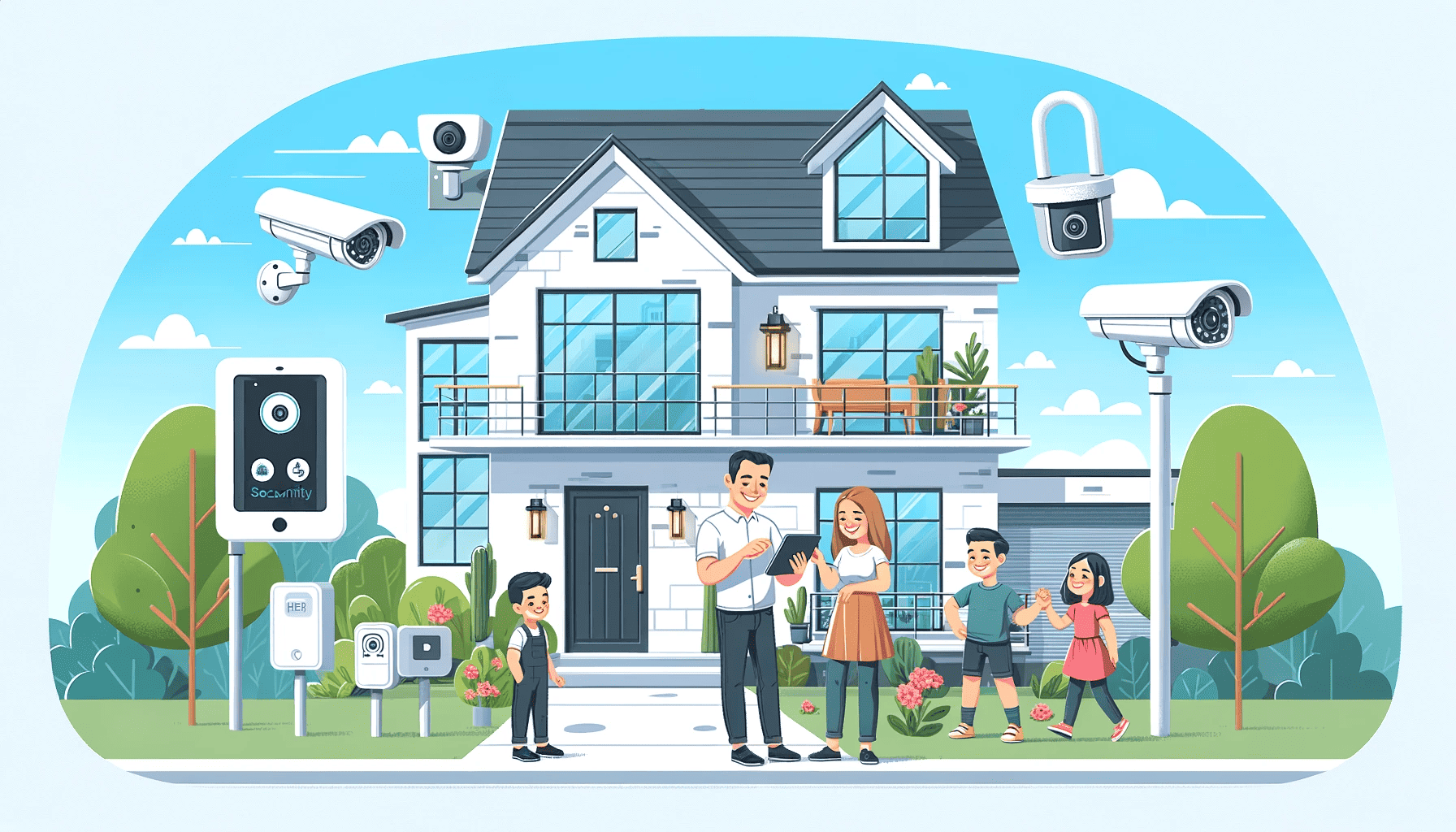 Home automation security systems offer a plethora of advantages, making them a valuable investment for homeowners. These systems provide advanced features that enhance security, convenience, and control over your home. Let’s explore some of the key benefits of home automation security:
Home automation security systems offer a plethora of advantages, making them a valuable investment for homeowners. These systems provide advanced features that enhance security, convenience, and control over your home. Let’s explore some of the key benefits of home automation security:
1. Remote Control and Monitoring
One of the standout benefits of home automation security systems is the ability to control and monitor your security system remotely. Whether you’re at work, on vacation, or simply in another room, you can access and manage your system from your smartphone or tablet. This allows you to arm or disarm the system, view live video feeds, and receive real-time alerts about any security events or suspicious activities at home.2. Integration with Whole-Home Automation
Home automation security systems seamlessly integrate with your existing smart home setup. They can be interconnected with other devices, such as lighting systems, thermostats, and entertainment systems. By incorporating your security system into a whole-home automation scheme, you can conveniently control all aspects of your home through a single interface. For instance, you can create custom scenarios like “movie time” that automatically dim the lights, lower the blinds, and activate the security system.3. Enhanced Security Features
Home automation security systems offer a range of advanced security features that bolster the protection of your home. These may include:- Motion detection: Sensors can detect any movement in and around your home, alerting you to any possible intrusions.
- Video monitoring: Cameras provide real-time video feeds, allowing you to keep an eye on your property from anywhere.
- Keypad entry: Secure keypads ensure that only authorized individuals can access your home.
- Smart locks: Remotely control and monitor your door locks, granting or revoking access as needed.
4. Convenience and Peace of Mind
With home automation security, you can enjoy convenience and peace of mind. Say goodbye to the stress of wondering if you locked the doors or set the security system before leaving home. With remote access, you can easily check and control your security system from anywhere. Whether you’re in bed at night or miles away, you can arm the system and ensure your home is secure with just a few taps on your smartphone. Overall, home automation security systems provide a comprehensive and integrated solution for safeguarding your home. With their remote control capabilities, integration with other smart home devices, advanced security features, and added convenience, these systems offer effective protection and peace of mind for homeowners.| Benefits of Home Automation Security | Description |
|---|---|
| Remote Control and Monitoring | Manage your security system from anywhere using your smartphone or tablet. |
| Integration with Whole-Home Automation | Seamlessly combine your security system with other smart home devices for centralized control. |
| Enhanced Security Features | Enjoy advanced features like motion detection, video monitoring, keypad entry, and smart locks. |
| Convenience and Peace of Mind | Control and monitor your security system remotely, providing convenience and peace of mind. |
Types of Home Automation Security Systems
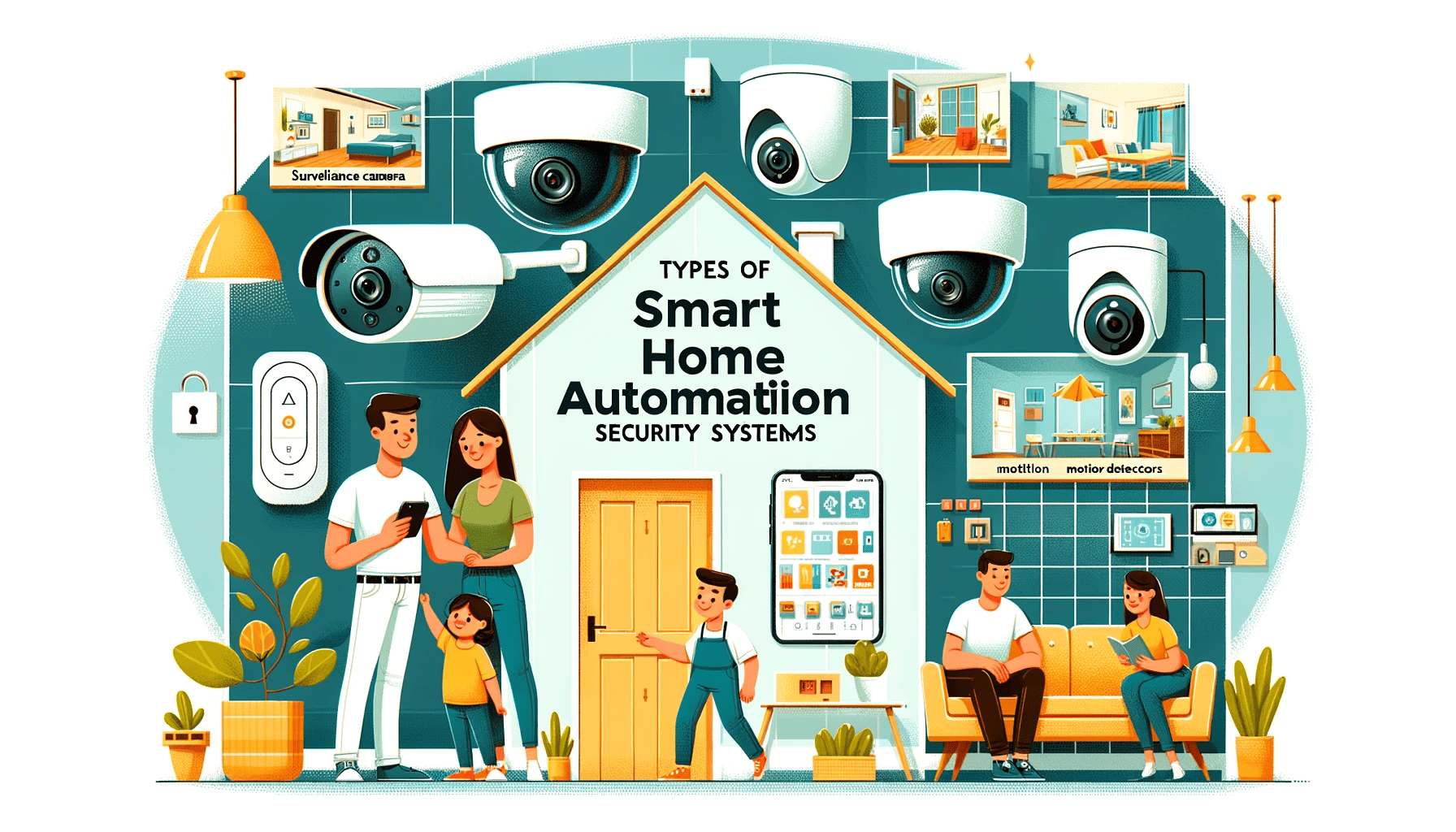 When it comes to home automation security systems, there is a wide range of options available to suit different needs and preferences. These systems are designed to provide automated security solutions, offering smart home monitoring and integrating seamlessly with other home security devices. Let’s explore the different types of home automation security systems:
When it comes to home automation security systems, there is a wide range of options available to suit different needs and preferences. These systems are designed to provide automated security solutions, offering smart home monitoring and integrating seamlessly with other home security devices. Let’s explore the different types of home automation security systems:
1. Basic Battery-Operated Sensors
Starting with the basics, there are battery-operated sensors that can be placed on doors and windows. These sensors trigger an alert when a door or window is opened, providing a simple yet effective form of home security.2. Motion Detection Systems
Motion detection systems use sensors to detect any movement within a specific area of your home. When motion is detected, the system can activate lights, sound alarms, or send notifications to homeowners, ensuring quick responses to potential threats.3. Video Monitoring Systems
Video monitoring systems are becoming increasingly popular in home automation security. These systems include surveillance cameras that provide real-time video footage of your home. With remote access capabilities, homeowners can monitor their property at any time, enhancing overall security and peace of mind.4. Notification Software
To keep homeowners informed about family member arrivals or any other activities, notification software is often integrated into home automation security systems. These notifications can be received on mobile devices, allowing homeowners to stay connected and aware of what’s happening at home, even when they are away. These are just a few examples of the types of home automation security systems available on the market. The key is to choose a system that meets your specific needs and preferences, incorporating the features that are most important to you. With automated security solutions and smart home monitoring, you can enhance the security of your home and gain greater peace of mind.Wireless Home Security vs. Wired Home Security
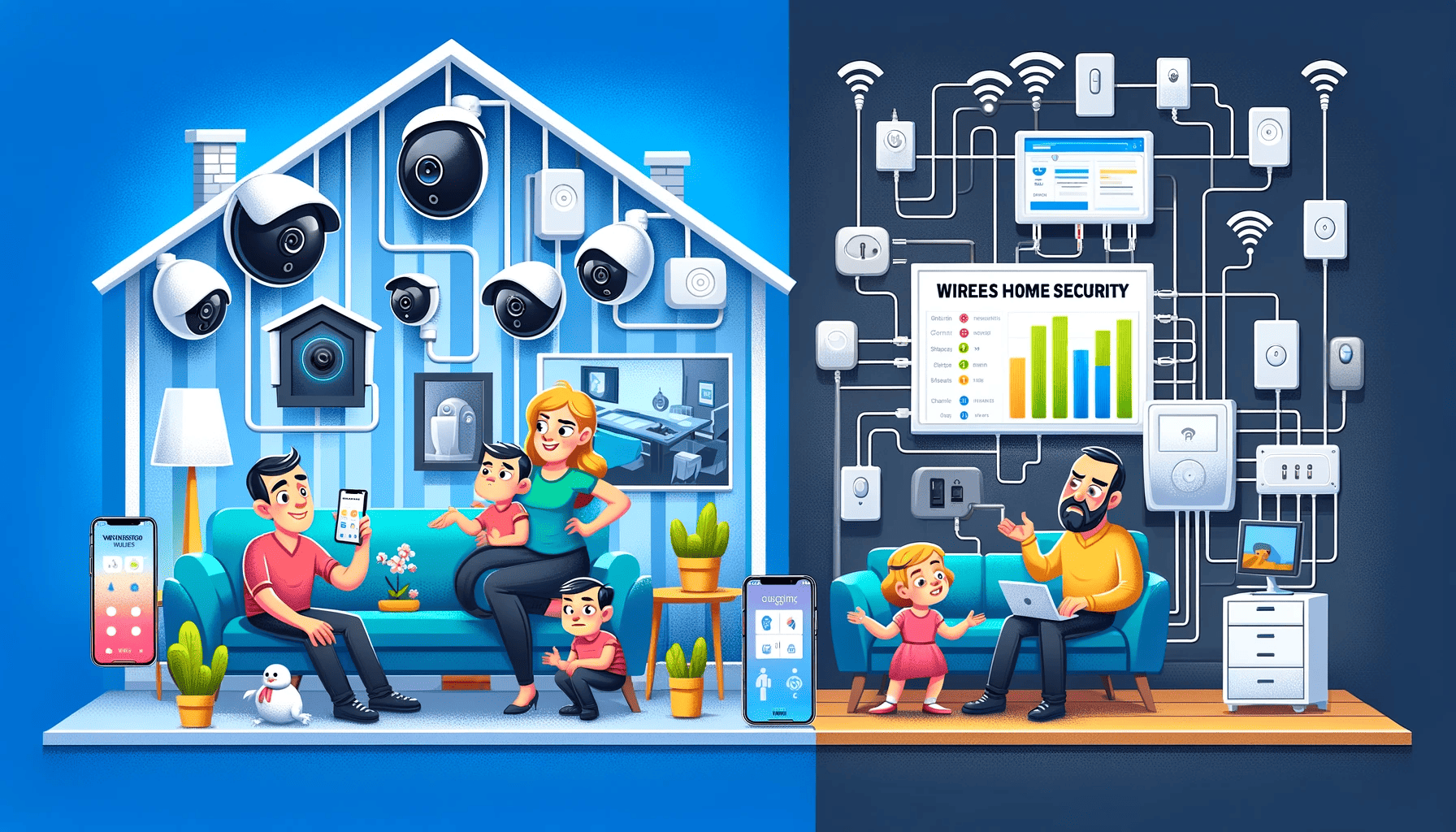 When it comes to securing your home, you have two main options: wireless home security systems and wired home security systems. Each option has its own advantages and considerations. Let’s compare the two to help you decide which one is best for you.
When it comes to securing your home, you have two main options: wireless home security systems and wired home security systems. Each option has its own advantages and considerations. Let’s compare the two to help you decide which one is best for you.
Wireless Home Security
Wireless home security systems have gained popularity in recent years, and for good reason. These systems operate through your home’s wireless network, providing flexibility and convenience. With a wireless home security system, you can control your system remotely from anywhere with an internet connection. Whether you’re at work, on vacation, or simply in another room, you’ll have access to your security system at your fingertips. This level of connectivity and control offers peace of mind and makes it easier than ever to monitor and protect your home.Wired Home Security
On the other hand, wired home security systems require physical wiring throughout your home. These systems are typically the best option for new construction or major renovations, as the wiring can be installed during the building process. While the installation process may be more involved, wired systems offer their own advantages. They are generally considered more reliable than wireless systems, as they are not susceptible to interference from other wireless devices. Additionally, wired systems often require less maintenance and have a longer lifespan. Ultimately, the decision between wireless and wired home security systems depends on your specific needs and circumstances. Consider factors such as ease of installation, flexibility, reliability, and long-term maintenance. If you’re looking for a system that offers convenience, remote access, and easy installation, a wireless home security system may be the best fit for you. However, if you value reliability and are willing to invest in the installation process, a wired home security system may be the better option. Stay tuned for more sections in our comprehensive guide to home automation security. In the next section, we will explore the process of choosing the right home automation security company.
Google Nest Hub Max 10" Smart Display with Google Assistant
Leave video messages for each other on Nest Hub Max, Make video calls or leave video messages with Duo hands-free,10-inch HD touchscreen, 30W subwoofer for high-quality audio, and Google Assistant makes issuing commands simple.

MyQ Smart Garage Door Video Keypad
Wide-Angle Camera, Customizable PIN Codes, and Smartphone Control – Take Charge of Your Garage Access – Works with Chamberlain, LiftMaster and Craftsman openers

Eufy Security C210 WiFi Smart Lock
Keyless Entry, Touchscreen Keypad, App Control, No Bridge, Easy Installation, BHMA Certified
Choosing the Right Home Automation Security Company
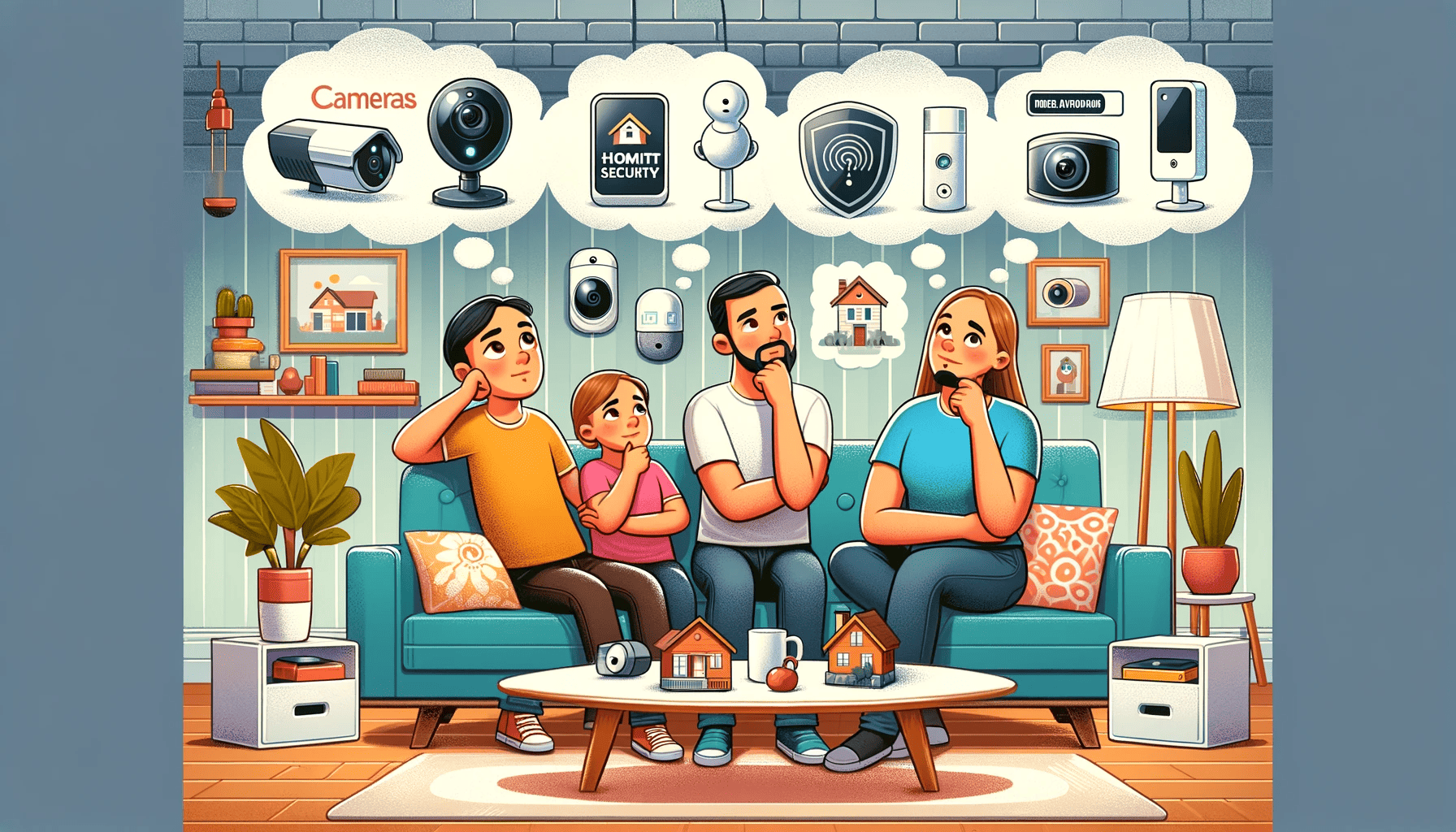 When it comes to home automation security, selecting the right company is crucial for ensuring the safety and protection of your home and loved ones. With the increasing number of home automation security companies in the market, it can be overwhelming to make a decision. However, with careful consideration and research, you can find a company that meets your specific requirements and provides reliable and comprehensive security solutions.
Here are some factors to consider when choosing a home automation security company:
When it comes to home automation security, selecting the right company is crucial for ensuring the safety and protection of your home and loved ones. With the increasing number of home automation security companies in the market, it can be overwhelming to make a decision. However, with careful consideration and research, you can find a company that meets your specific requirements and provides reliable and comprehensive security solutions.
Here are some factors to consider when choosing a home automation security company:
- Reputation: Research the reputation of different companies in the industry. Look for companies with a proven track record of providing quality security solutions and excellent customer service. Reading customer reviews and testimonials can give you valuable insights into the experiences of others.
- Customer Support: A reliable home automation security company should offer excellent customer support. Look for a company that is responsive, knowledgeable, and readily available to address any concerns or technical issues that may arise.
- Equipment: Evaluate the equipment offered by different companies. Look for companies that provide reliable and state-of-the-art security equipment, such as smart cameras, motion detectors, and smart locks. Having high-quality and cutting-edge equipment is essential for the effectiveness of your home security system.
- Monitoring Options: Comprehensive monitoring options are crucial for ensuring round-the-clock protection. Look for a company that offers various monitoring options, such as professional monitoring or self-monitoring through mobile applications. This allows you to choose the level of monitoring that best suits your needs.
- Pricing: Compare the pricing structures of different home automation security companies. Consider the upfront costs of equipment and installation, as well as any ongoing monthly fees or contracts. It’s important to find a company that offers competitive pricing without compromising on the quality of their service.
Comparison of Home Automation Security
This post contains affiliate links
The Role of Home Automation in Energy Efficiency
 Home automation systems offer more than just security; they also play a significant role in energy efficiency. By integrating automation with security measures, homeowners can create a more environmentally friendly and cost-effective living space. These systems allow for the programming and control of lighting, heating, and cooling systems, enabling residents to save energy and reduce utility bills.
With a home automation system, you can schedule lights to turn on and off automatically, adjusting them based on the time of day or occupancy. This eliminates the need for manual operation and ensures that lights aren’t left on unnecessarily. Additionally, automated thermostats can regulate temperature settings based on occupancy, optimizing energy usage and comfort.
Home automation systems offer more than just security; they also play a significant role in energy efficiency. By integrating automation with security measures, homeowners can create a more environmentally friendly and cost-effective living space. These systems allow for the programming and control of lighting, heating, and cooling systems, enabling residents to save energy and reduce utility bills.
With a home automation system, you can schedule lights to turn on and off automatically, adjusting them based on the time of day or occupancy. This eliminates the need for manual operation and ensures that lights aren’t left on unnecessarily. Additionally, automated thermostats can regulate temperature settings based on occupancy, optimizing energy usage and comfort.
Enhancing Energy Efficiency through Home Automation
Home automation systems offer various features that contribute to energy efficiency:-
- Scheduled Lighting: By setting specific schedules for lighting, homeowners can minimize energy waste by ensuring lights are only on when needed.
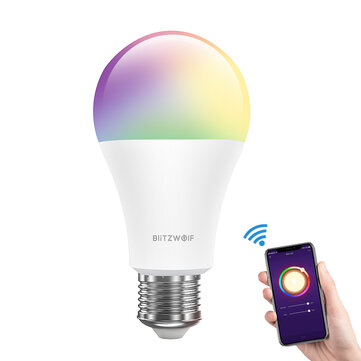 BlitzWolf® BW-LT21 Smart LED Light Bulb | Works With Amazon Alexa Google Assistant
BlitzWolf® BW-LT21 Smart LED Light Bulb | Works With Amazon Alexa Google Assistant
-
- Smart Thermostats: Automated temperature control allows precise customization based on individual preferences and occupancy, ensuring energy-efficient heating and cooling.
Alarm.com Smart Thermostat | HD
- Sleek, color touchscreen display for an engaging customer experience that delivers the next-level of comfort and control
- Easy setup wizard, and local configuration, the Smart Thermostat HD makes installation a breeze
- Can also monitor the health of the heating and cooling system, deliver monthly performance reports, and even alert you to potential HVAC issues right on its display
This post contains affiliate links.- Energy Monitoring: Some advanced automation systems provide real-time energy consumption data, empowering homeowners to make informed decisions to further reduce energy usage.
Smart Home Energy Monitor
- Monitor your home’s real power anywhere, anytime to prevent costly repairs, conserve energy, and save costs.
- Monitor solar / net metering.
- Accurately monitor your air conditioner, furnace, water heater, washer, dryer, range to save costs.
This post contains affiliate links.- Power Management: Home automation enables the centralized control of power outlets and appliances, allowing for more efficient management of standby power and reducing energy waste.
GE Energy Management | Occupancy Sensing Wireless Thermostat
- Using a built-in occupancy sensor, differentiates between incidental and guest occupancy to completely eliminate unnecessary energy use
- Effortless installation
- Easy plug and play installation via quick connector
This post contains affiliate links.- A well-implemented home automation system not only provides an added layer of security but also helps homeowners reduce their carbon footprint and lower energy costs. By harnessing the power of automation, individuals can create a more sustainable and comfortable living environment.
The Future of Home Automation Security
As technology continues to advance, the future of home automation security looks promising. With the rise of smart home devices and the Internet of Things (IoT), home security systems are becoming more sophisticated and interconnected, offering enhanced protection for homeowners. These advancements in technology pave the way for seamless integration and smarter security features that can transform our homes into safe and secure environments. One of the significant developments in home automation security is the integration of smart home devices. These devices, such as smart locks, video doorbells, and security cameras, can be seamlessly connected to create a comprehensive security system. With the ability to control and monitor these devices remotely via smartphone apps, homeowners have greater control over their home’s security.Furthermore, the Internet of Things (IoT) plays a vital role in the future of home automation security. The IoT allows different devices and systems to communicate and share data, creating a network of interconnected devices. This connectivity enables a higher level of automation, where security systems can respond to specific events or triggers automatically. For example, if a security camera detects motion, it can send an alert to the homeowner’s smartphone and even trigger other actions, such as turning on lights or sounding an alarm. With these advancements, home automation security systems are evolving to provide more robust protection. They offer features like facial recognition technology, which can recognize family members and authorized individuals, further enhancing security and reducing false alarms. Additionally, voice assistants, such as Amazon Alexa or Google Assistant, can be integrated with home security systems, allowing homeowners to control their security devices using voice commands.
Echo Studio | Our best-sounding smart speaker ever – With Dolby Atmos, spatial audio processing technology, and Alexa | Charcoal
Echo Show 8 (3rd Gen, 2023 release) | With Spatial Audio, Smart Home Hub, and Alexa | Charcoal
This post contains affiliate links.Table: Comparative Features of Home Automation Security Systems
With these advancements and the ever-growing demand for smart home security, the future holds endless possibilities for home automation security systems. As technology continues to evolve, we can expect more innovative features, seamless integration with other smart home devices, and even stronger protection for our homes. Whether it’s facial recognition, artificial intelligence, or advanced sensors, the future of home automation security is aimed at making our homes smarter, safer, and more secure.Feature Traditional Home Security Advanced Home Automation Security Remote Monitoring Limited access to security system controls Full control and monitoring capabilities from anywhere Integration Isolated security components Seamless integration with smart home devices and IoT Automation Manual control of security devices Automated actions based on events and triggers Advanced Technology Basic security features Facial recognition, voice control, and advanced sensors DIY vs. Professional Installation
When it comes to installing a home automation system or a home security system, homeowners have two options to consider: a do-it-yourself (DIY) approach or professional installation. Each option offers its own advantages and considerations, so it’s important to weigh the pros and cons before making a decision.
DIY Installation
A DIY installation allows homeowners to take control of the setup process. With DIY home automation and security systems, you have the freedom to customize and expand your system as needed. These systems are often designed to be user-friendly, making installation a straightforward process even for those with limited technical knowledge. DIY installations are typically more affordable compared to professional installations since you don’t have to pay for labor costs. Additionally, you have the flexibility to choose the specific components and features that best meet your needs and budget. However, it’s important to note that DIY installations may require more time and effort on your part. You’ll be responsible for researching and selecting the right equipment, as well as troubleshooting any issues that may arise during installation. Additionally, if you’re not familiar with the technical aspects of setting up a home automation or security system, you may run into difficulties during the installation process.This post contains affiliate links.Professional Installation
Professional installation offers the convenience of having experts handle the setup and integration of your home automation or security system. By hiring professionals, you can ensure that all components are properly installed, configured, and integrated for optimal performance. Professional installers have the knowledge and experience to handle complex installations and can provide guidance on the best setup for your specific needs. Professional installations provide peace of mind, knowing that your system is installed correctly and functioning optimally. You can rely on the expertise of professionals to ensure that all components are connected, and devices are synchronized seamlessly. However, professional installations may come at a higher cost compared to DIY installations. In addition to the equipment costs, you’ll need to factor in the fees for professional labor. Professional installations may also require scheduling an appointment and coordinating with the installation team, which could cause delays in getting your system up and running. Ultimately, the choice between DIY and professional installation depends on your comfort level with technology, budget considerations, and the complexity of the system you’re installing. If you’re confident in your technical abilities and prefer a more hands-on approach, a DIY installation might be the right choice for you. However, if you value convenience and want the assurance of a professionally installed system, it’s worth considering professional installation.Factors to Consider When Choosing a Home Security System
When it comes to protecting your home, choosing the right security system is crucial. There are several factors to consider before making a decision. Below are some key considerations to help you select a home security system that meets your needs:
1. Level of Monitoring
Firstly, determine the level of monitoring you desire. Are you comfortable with self-monitoring, where you will be responsible for monitoring alarms and managing notifications? Or do you prefer professional monitoring, where a dedicated team oversees your home’s security round-the-clock? Consider your lifestyle, schedule, and available resources when deciding which monitoring option is best for you.2. Compatibility with Smart Home Devices
If you already have smart home devices in your home, it’s essential to choose a security system that is compatible with your existing setup. Ensure that the security system can integrate seamlessly with your smart home devices, allowing you to control and monitor them conveniently from a single platform. This integration enhances the overall functionality and convenience of your smart home.3. Upfront and Ongoing Costs
Another key factor to consider is the cost of the home security system. Evaluate the upfront costs of the system, including the equipment and installation fees. Additionally, inquire about any ongoing monthly fees or contracts associated with professional monitoring services. It’s important to have a clear understanding of the financial commitment involved in order to make an informed decision. Once you’ve assessed these factors, you’ll be better equipped to choose a home security system that aligns with your monitoring preferences, integrates with your smart home devices, and fits within your budget.
With the right home security system in place, you can have peace of mind knowing that your home and loved ones are protected.Factors to Consider Self-Monitoring Professional Monitoring Level of monitoring Responsible for monitoring alarms and notifications Dedicated team oversees security round-the-clock Compatibility with smart home devices May vary depending on the system Ensure compatibility for seamless integration Upfront and ongoing costs Generally lower upfront costs May have monthly fees or contracts The Importance of Monitoring, Alerts, and Emergency Features
Monitoring, alerts, and emergency features are crucial components of a home security system. When choosing a home security system, it’s important to consider the level of monitoring desired and the availability of advanced features that can enhance the security of your home. Most home security systems offer self-monitoring capabilities through mobile applications. This allows users to check in on their devices remotely and receive push notifications for events such as package deliveries or unexpected activities. Advanced features like facial recognition and communication with emergency services can provide an additional layer of security and peace of mind. When selecting a home security system, take into account the following:
- The ability to self-monitor devices remotely
- Push notifications for important events
- Facial recognition for added security
- Communication with emergency services
Understanding the Costs of Home Automation Security
When considering home automation security systems, it’s important to understand the associated costs. Factors such as the brand, features, and ongoing services can influence the overall expense. By carefully evaluating these costs, you can make an informed decision and find a system that meets both your security needs and budget. The upfront costs of a home automation security system typically include the purchase of equipment. This can range from sensors and cameras to control panels and smart locks. The price will vary depending on the brand and specific features offered. It’s essential to research different options and compare prices to find a system that suits your requirements. In addition to the upfront costs, there may be monthly fees for professional monitoring or additional services. Professional monitoring provides an added layer of security by having a team of experts monitor your home 24/7. These services often include features like remote access, alerts, and emergency response. While these fees can increase the overall cost, they provide peace of mind and ensure that your home is protected at all times. Wireless home security systems, which utilize your home’s wireless network, offer flexibility and convenience. However, they may require ongoing fees for cloud storage of video recordings or additional smart home integrations. It’s important to consider any recurring expenses when budgeting for a home automation security system. When comparing costs, it’s also crucial to assess the value that a home automation security system provides. These systems offer automated security solutions that can enhance the safety and convenience of your home. By integrating various devices and features, they create a seamless and efficient security ecosystem. Evaluate the features that are important to you and weigh them against the associated costs to determine the overall value. In conclusion, understanding the costs of home automation security systems is essential when making a purchase decision. Consider the upfront equipment costs, monthly fees for monitoring and additional services, as well as the overall value and benefits provided by the system. By thoroughly evaluating these factors, you can choose a system that offers the right combination of security and affordability for your home.
Costs Comparison of Home Automation Security
The costs included in this table are estimates only*
Additional Notes:
- Vivint: Costs tend to be higher due to professional installation and more comprehensive equipment packages. Offers the most extensive smart home features but with longer contracts.
- SimpliSafe: More affordable with DIY installation and flexible plans. Offers basic security features but limited smart home integration.
- Ring: Best for video-centric security with affordable equipment and flexible monitoring options. Limited smart home features compared to Vivint.
Upfront Equipment Costs:
- Vivint: Costs vary greatly depending on the chosen package, which can include basic sensors, cameras, touchscreens, and smart home devices.
- SimpliSafe: Offers several pre-configured packages with basic equipment like sensors and keypads. Additional equipment can be purchased separately.
- Ring: Offers various starter kits with video doorbells and optional add-ons like indoor/outdoor cameras, floodlights, and smart locks.
Monthly Monitoring Fees:
- Vivint: Monitoring is required for all systems. Prices vary depending on the chosen plan and features like cellular backup and video storage.
- SimpliSafe: Monitoring is optional. Basic monitoring starts at $17.99, while cellular backup and video storage increase the cost.
- Ring: Monitoring is optional. Basic self-monitoring is free, while professional monitoring with cloud recording costs $5.99 or $20.99 per month.
Additional Services:
- Vivint: Offers the widest range of smart home devices and automation features, including thermostats, lighting control, and garage door openers.
- SimpliSafe: Offers limited smart home integration with select devices like thermostats and smart locks.
- Ring: Primarily focuses on video security but offers some smart home features like lights and locks through integration with other platforms like Alexa and Google Assistant.
Conclusion:
The best system for you will depend on your budget, security needs, and desired smart home features. Vivint offers the most comprehensive package but at a higher cost. SimpliSafe is a more affordable option for basic security needs. Ring is ideal for those who prioritize video security and smart home integration with other platforms.
Conclusion
Home automation security systems offer a comprehensive solution to protect your home, providing convenience, energy efficiency, and peace of mind. By integrating advanced technologies into your home, you can enhance the security of your sanctuary and enjoy a more comfortable and secure living space. Whether you opt for a do-it-yourself (DIY) installation or professional setup, it is crucial to choose a home automation security system that meets your specific requirements and preferences. Consider factors such as the level of control and monitoring desired, compatibility with existing smart home devices, and overall cost. As technology continues to advance, the future of home automation security looks promising. With the rise of smart home devices and the Internet of Things (IoT), homes are becoming smarter and safer. Stay updated with the latest advancements to ensure your home remains protected with state-of-the-art security measures. Investing in a home automation security system not only provides robust protection but also offers numerous other benefits, such as energy efficiency and convenience. Take the necessary steps to secure your home and create a safe haven for you and your loved ones.FAQ
What are the benefits of home automation security?
Home automation security systems offer the ability to control your security system remotely and monitor your home’s activities. They can be integrated into a whole-home automation scheme, allowing for seamless control of lighting and entertainment systems. These systems often include features like motion detection, video monitoring, and keypad entry for enhanced security and convenience.What are the types of home automation security systems available?
There are various types of home automation security systems, ranging from basic battery-operated sensors on doors and windows to more sophisticated systems that are integrated with the entire home automation setup. These systems may include motion detection, video monitoring, and notification software to keep homeowners informed about family member arrivals. Home automation security systems can be customized to suit the specific needs and preferences of homeowners.What is the difference between wireless and wired home security systems?
Wireless home security systems operate via the home’s wireless network, allowing homeowners to control the system remotely from anywhere with an internet connection. Wired systems require physical wiring and are typically more suitable for new construction or major renovations.How do I choose the right home automation security company?
When selecting a home automation security company, consider factors such as reputation, customer reviews, and pricing. Look for a company that offers reliable equipment, comprehensive monitoring options, and excellent customer support.How does home automation contribute to energy efficiency?
Home automation systems can be programmed to control lighting, heating, and cooling systems, allowing homeowners to save energy and reduce utility bills. By integrating home automation with security measures, homeowners can create a more efficient and environmentally friendly living environment.Ecobee New Smart Thermostat Enhanced
Fully Programmable Wifi Thermostat – Works with Siri, Alexa, Google Assistant – Energy Star Certified
Moen Sleek Spot Resist Stainless One-Handle Smart Touchless Kitchen Faucet
Sleek Pull Down Sprayer, Voice Control, and Power Boost, four unique methods of control that you can mix and match, independent of the handle position – Voice, App, Hands Free, or Manual, Fully customizable presets for exact measurements and exact temperatures will make daily tasks a breeze, Wave sensor positioned at the front of the faucet.
Smart Home Energy Monitor
Monitor your home’s real power anywhere, anytime to prevent costly repairs, conserve energy, and save costs. Monitor solar / net metering. Accurately monitor your air conditioner, furnace, water heater, washer, dryer, range to save costs.
This post contains affiliate links.What does the future hold for home automation security?
The future of home automation security is promising, with advancements in technology and connectivity. With the introduction of smart home devices and the Internet of Things (IoT), home automation security systems are becoming more sophisticated and interconnected.Should I opt for DIY or professional installation?
Homeowners can choose between a do-it-yourself (DIY) approach or professional installation. DIY systems are typically easier to install and offer flexibility in terms of customization and expansion. Professional installation ensures proper setup and integration of all components, providing peace of mind and professional guidance.What factors should I consider when choosing a home security system?
When selecting a home security system, consider factors such as the level of monitoring desired, compatibility with existing smart home devices, and upfront and ongoing costs. Determine if you prefer self-monitoring or professional monitoring and assess the compatibility of the system with other smart home devices you may already own.What role do monitoring, alerts, and emergency features play in home security systems?
Monitoring, alerts, and emergency features are crucial components of a home security system. Most systems offer self-monitoring through mobile applications, allowing users to check on their devices and receive push notifications for events like package deliveries.What are the costs associated with home automation security systems?
The costs associated with home automation security systems can vary depending on the brand, features, and ongoing services. Consider the upfront costs of the equipment as well as any monthly fees for professional monitoring or additional services.How can home automation security systems enhance the security of my home?
Home automation security systems provide a comprehensive solution for protecting your home, offering convenience, energy efficiency, and peace of mind. Whether you choose a DIY or professional installation, select a system that meets your specific needs and preferences.




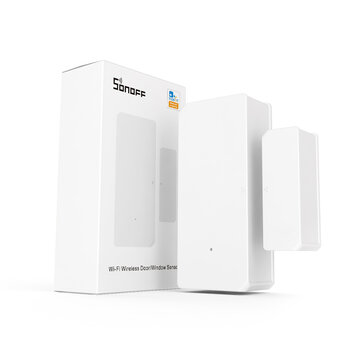






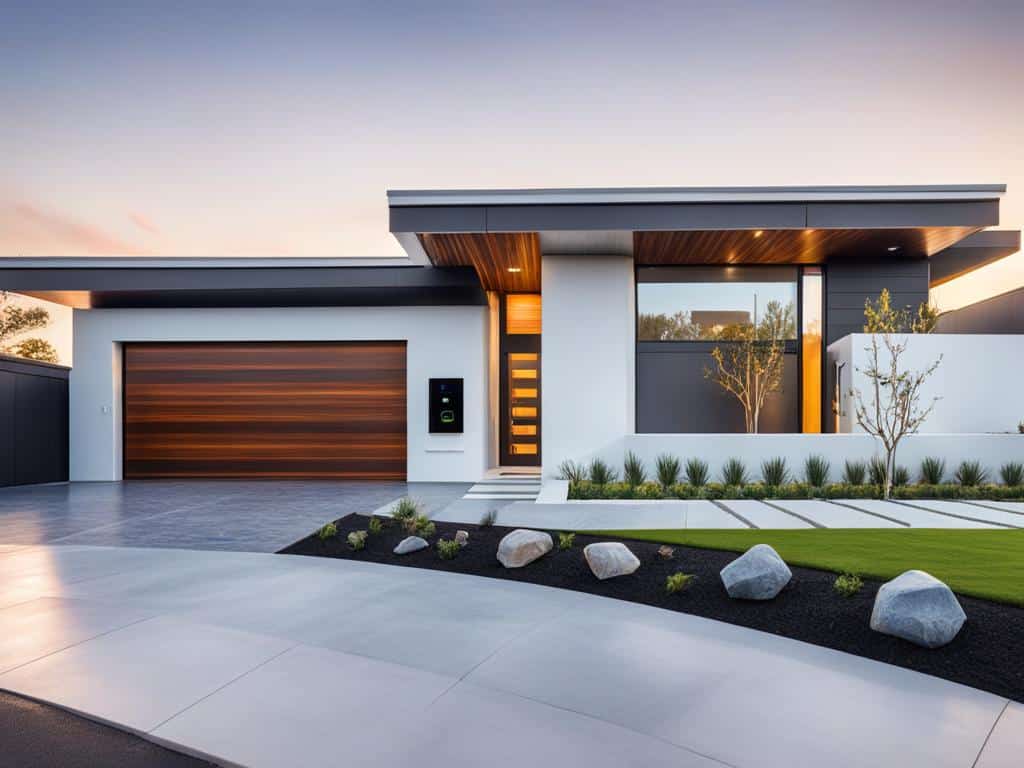 Furthermore, the Internet of Things (IoT) plays a vital role in the future of home automation security. The IoT allows different devices and systems to communicate and share data, creating a network of interconnected devices. This connectivity enables a higher level of automation, where security systems can respond to specific events or triggers automatically. For example, if a security camera detects motion, it can send an alert to the homeowner’s smartphone and even trigger other actions, such as turning on lights or sounding an alarm.
With these advancements, home automation security systems are evolving to provide more robust protection. They offer features like facial recognition technology, which can recognize family members and authorized individuals, further enhancing security and reducing false alarms. Additionally, voice assistants, such as
Furthermore, the Internet of Things (IoT) plays a vital role in the future of home automation security. The IoT allows different devices and systems to communicate and share data, creating a network of interconnected devices. This connectivity enables a higher level of automation, where security systems can respond to specific events or triggers automatically. For example, if a security camera detects motion, it can send an alert to the homeowner’s smartphone and even trigger other actions, such as turning on lights or sounding an alarm.
With these advancements, home automation security systems are evolving to provide more robust protection. They offer features like facial recognition technology, which can recognize family members and authorized individuals, further enhancing security and reducing false alarms. Additionally, voice assistants, such as 

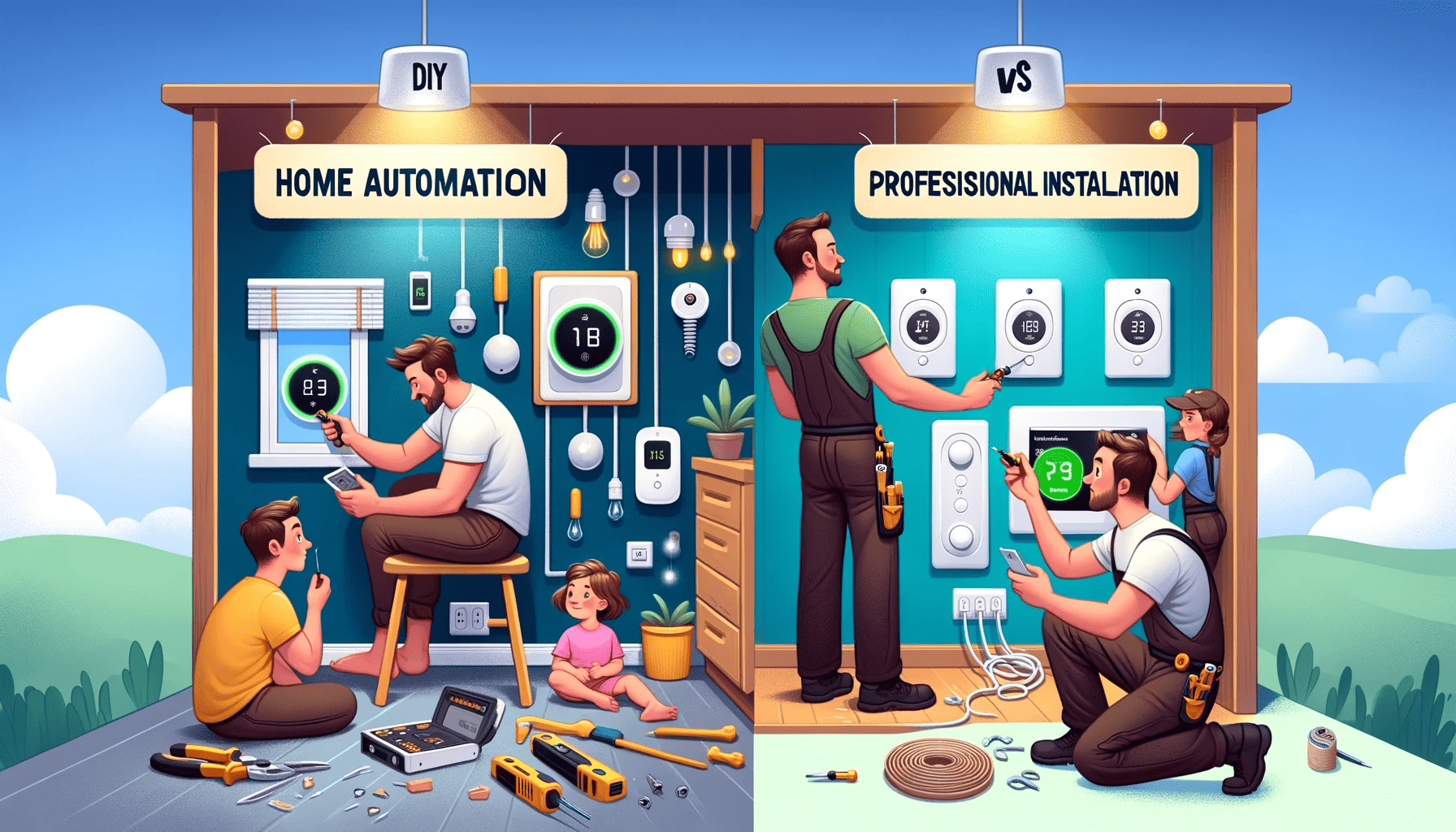 When it comes to installing a home automation system or a home security system, homeowners have two options to consider: a do-it-yourself (DIY) approach or professional installation. Each option offers its own advantages and considerations, so it’s important to weigh the pros and cons before making a decision.
When it comes to installing a home automation system or a home security system, homeowners have two options to consider: a do-it-yourself (DIY) approach or professional installation. Each option offers its own advantages and considerations, so it’s important to weigh the pros and cons before making a decision.
 When it comes to protecting your home, choosing the right security system is crucial. There are several factors to consider before making a decision. Below are some key considerations to help you select a home security system that meets your needs:
When it comes to protecting your home, choosing the right security system is crucial. There are several factors to consider before making a decision. Below are some key considerations to help you select a home security system that meets your needs:
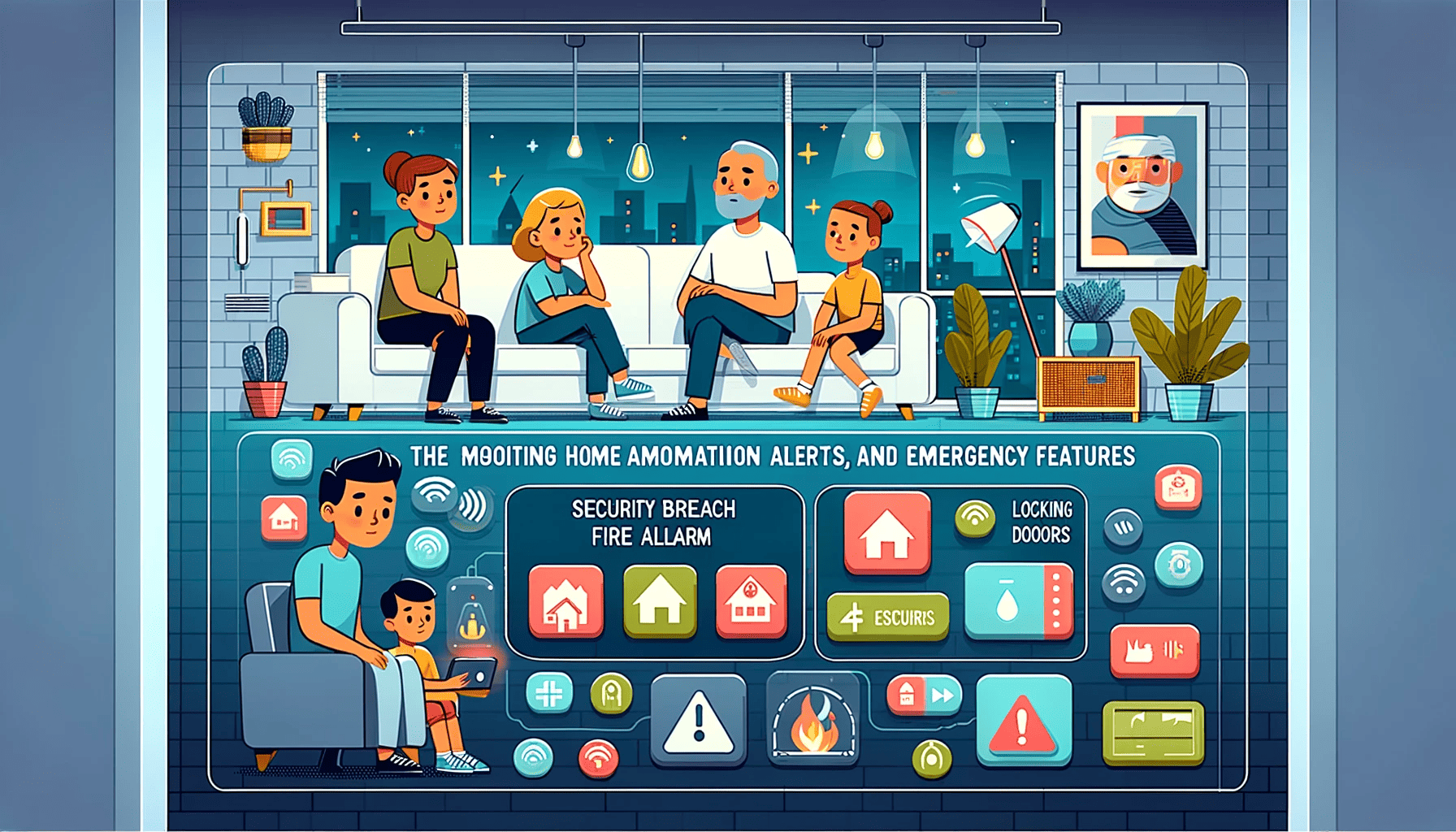 Monitoring, alerts, and emergency features are crucial components of a home security system. When choosing a home security system, it’s important to consider the level of monitoring desired and the availability of advanced features that can enhance the security of your home.
Most home security systems offer self-monitoring capabilities through mobile applications. This allows users to check in on their devices remotely and receive push notifications for events such as package deliveries or unexpected activities.
Advanced features like facial recognition and communication with emergency services can provide an additional layer of security and peace of mind.
When selecting a home security system, take into account the following:
Monitoring, alerts, and emergency features are crucial components of a home security system. When choosing a home security system, it’s important to consider the level of monitoring desired and the availability of advanced features that can enhance the security of your home.
Most home security systems offer self-monitoring capabilities through mobile applications. This allows users to check in on their devices remotely and receive push notifications for events such as package deliveries or unexpected activities.
Advanced features like facial recognition and communication with emergency services can provide an additional layer of security and peace of mind.
When selecting a home security system, take into account the following:
 When considering home automation security systems, it’s important to understand the associated costs. Factors such as the brand, features, and ongoing services can influence the overall expense. By carefully evaluating these costs, you can make an informed decision and find a system that meets both your security needs and budget.
The upfront costs of a home automation security system typically include the purchase of equipment. This can range from sensors and cameras to control panels and smart locks. The price will vary depending on the brand and specific features offered. It’s essential to research different options and compare prices to find a system that suits your requirements.
In addition to the upfront costs, there may be monthly fees for professional monitoring or additional services. Professional monitoring provides an added layer of security by having a team of experts monitor your home 24/7. These services often include features like remote access, alerts, and emergency response. While these fees can increase the overall cost, they provide peace of mind and ensure that your home is protected at all times.
Wireless home security systems, which utilize your home’s wireless network, offer flexibility and convenience. However, they may require ongoing fees for cloud storage of video recordings or additional smart home integrations. It’s important to consider any recurring expenses when budgeting for a home automation security system.
When comparing costs, it’s also crucial to assess the value that a home automation security system provides. These systems offer automated
When considering home automation security systems, it’s important to understand the associated costs. Factors such as the brand, features, and ongoing services can influence the overall expense. By carefully evaluating these costs, you can make an informed decision and find a system that meets both your security needs and budget.
The upfront costs of a home automation security system typically include the purchase of equipment. This can range from sensors and cameras to control panels and smart locks. The price will vary depending on the brand and specific features offered. It’s essential to research different options and compare prices to find a system that suits your requirements.
In addition to the upfront costs, there may be monthly fees for professional monitoring or additional services. Professional monitoring provides an added layer of security by having a team of experts monitor your home 24/7. These services often include features like remote access, alerts, and emergency response. While these fees can increase the overall cost, they provide peace of mind and ensure that your home is protected at all times.
Wireless home security systems, which utilize your home’s wireless network, offer flexibility and convenience. However, they may require ongoing fees for cloud storage of video recordings or additional smart home integrations. It’s important to consider any recurring expenses when budgeting for a home automation security system.
When comparing costs, it’s also crucial to assess the value that a home automation security system provides. These systems offer automated 





